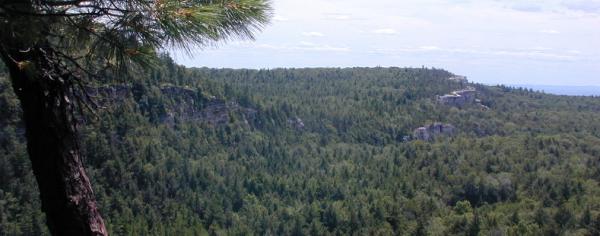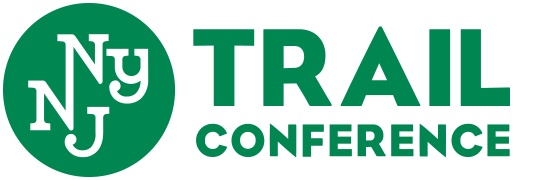Defending Parks and Open Space
Title
Body
 |
| This view at Minnewaska State Park Preserve and the public trails that lead to it exist thanks to decades of civic action on behalf of open space by people who love the outdoors. |
From the beginning, Trail Conference members and volunteers have always been hands-on, get-to-work kind of people. This has been true when it comes to trails and it has been true when it comes to protecting open space and the natural experience of hiking.
The Trail Conference has been involved in most, if not all, major efforts to protect access to open space in our region, including Storm King and Bull mountains along the Hudson River, Minnewaska in the Shawangunks, the Delaware Water Gap in the Kittatinnies, and Sterling Forest in the Ramapo Highlands. Today, these are favorite destinations for tens of thousands of outdoor recreationists each year. Perhaps, we even take the existence of these places for granted. We do so at our peril. Each was once, and most still are, subject to the impact of development.
The excellent selection of hiking opportunities throughout the region is testament to those who came before us. They didn't waiver when it came to advocating for open space and parks in this the most densely population region of the country. They made a difference by taking time to convince the decision makers to make the right decisions.
That is what all Trail Conference members and volunteers need to do right now in the face of disproportionate budget cuts to parks and open space in New York and New Jersey. Nothing is more important at this time, and everyone can make a difference regardless of skill set, physical capability, or spare time by simply contacting your state legislators.
Even though there has been a tide of public sentiment in favor of protecting open space over the last decade, park funding in each state has eroded year by year. In New York, the governor's budget proposal would amount to a 35% cut in the last two years, as well as a complete moratorium on funding open space. In New Jersey, deficits that are predicted to be just as large as in New York will have to be eliminated from an even smaller budget.
Parks will be closed if the proposed New York budget is passed. An excerpt from Commissioner Carol Ash's testimony follows:
Clearly, the State Parks budget has been stretched to the breaking point. If forced to absorb additional budget cuts next year, OPHRP will have no option but to begin closing state parks and historic sites. Closing parks would be a terrible step that would have a negative impact on New York's economy and quality of life:
- Given that parks produce economic activity five times the amount spent on park budgets, closing State Parks will hurt local tourism industries and create negative economic impacts much greater than the modest savings to the state budget.
- State Parks generate state revenue, including entrance fees, camping fees, and picnic shelter rentals. Park revenues account for a third of OPRHP's operating budget. When a park is closed to reduce costs, the agency also loses revenue. Every $1 million in spending reductions through park closings generates only $650,000 in net budget savings.
- Visitation to the State Parks System is up - more than 55 million residents and tourists visited State Parks in 2009. At a time when many New York families are struggling due to the economic downturn, our State Parks provide affordable, close-to-home recreational and vacation opportunities.
As Commissioner Ash points out, parks are one of the few remaining affordable ways in which New Yorkers can enjoy healthy recreation and respite in these difficult times. Furthermore, thousands of people volunteer at parks, investing their sweat along with their taxes and making parks among the least costly of essential government services to the public.
So, why are parks and open space cut disproportionately in the budget? The answer is because they are legally discretionary. They are not mandated by regulation or federal law. The only thing that will protect parks and open space in the state budgets is your voice, early and often.
I can't emphasize enough that you need to contact your state legislators now or face the regret of tomorrow when parks are closed, trails bulldozed for powerlines, and open space developed.
The good news is that our website has the information you need to make a difference on the issue(s) that are most important to you. We haven't spent a lot of money to have all the bells and whistles of some advocacy sites, but we have listed each issue that directly impacts the public's ability to enjoy the outdoors. Clicking through the issues will give you information you need to understand and to influence the outcome by taking the appropriate action.
The most important thing you need, however, is something you already have: your own passion for getting yourself and others outside in nature. If enough of us convey that to our representatives, their support for parks and open space will follow, naturally. Take your first step at www.nynjtc.org; click on Trails Advocacy under Be Informed.
Ed Goodell is executive director of the New York-New Jersey Trail Conference.
